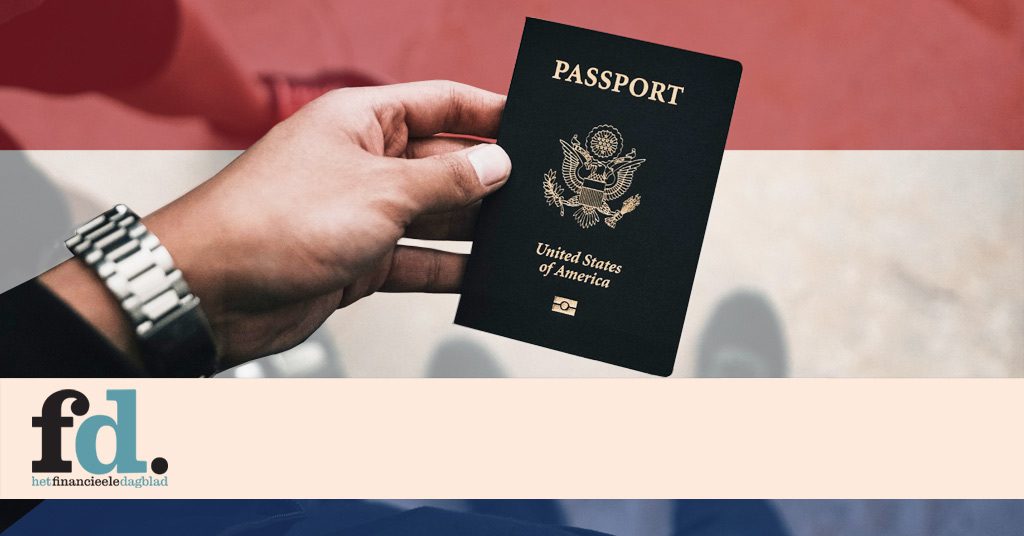
American Dutch Risk Losing Their Bank Account

According to Het Financieele Dagblad, American Dutch are unable to request essential data now that the US Consulate is closed, and they risk losing their bank account.
In short:
- American Dutch must submit information such as an American citizen service number (SSN) to Dutch banks.
- However, due to the closure of the US Consulate and other agencies, the application process is suspended.
- Banks are required to pass on this information from their clients to US tax authorities, otherwise sanctions are imminent.
- In the worst-case scenario, people risk losing their bank account.
Application procedure suspended due to Corona crisis
Dutch people who, by chance, also possess American nationality are, in the worst-case scenario, at risk of losing their bank account. Banks need their US citizen service number (i.e., Social Security Number or SSN), but the application process has been stalled due to the coronavirus crisis.
This is reported by Americans Overseas, an organization that assists these so-called “accidental Americans.” A week and a half ago, reports came in of people whose bank accounts had been frozen or canceled.
Starting this year, Dutch banks are obliged to report their American clients’ SSNs to US tax authorities, according to a 2013 tax treaty with the United States. If banks cannot do this, sanctions may follow.
Bureaucratic nightmare for Dutch Americans
Under normal circumstances, it is already a bureaucratic and expensive nightmare for many Dutch Americans to request the information required. They are American because one of their parents is, but they often do not have an SSN as they have never lived in the US, or they were born in the US but moved to the Netherlands with their Dutch parents in their childhood. It is estimated that some 20,000 people fall into this category.
Appointments at the US Consulate canceled
Now that the US Consulate has been closed indefinitely due to the coronavirus, these people can’t obtain the necessary information.
“Appointments at the consulate that people have been waiting for months have been canceled,” says Daan Durlacher of Americans Overseas. He adds that the office in Dublin, which arranges the provision of these numbers to the Dutch concerned, is also closed.
ABN AMRO closes bank accounts
Tirso Frances, born and living in the US until he was four, went – unsuccessfully – to the US Consulate’s monthly walk-in consultation since he had not been able to get anyone on the phone. Last fall, he was taken completely by surprise when his debit card stopped working during the holidays.
The reason: ABN AMRO had frozen his account. An email about this ended up in his spam folder during the summer holidays. “After being sent from pillar to post for weeks, I finally managed to convince them to lift the freeze through a lot of insistence,” says Frances.
He found out he had two options: either give up his American citizenship or apply for an SSN. Frances opted for the latter and applied to the US Consulate in late January. He was supposed to receive proof of that request within two weeks, which would be sufficient information for the banks to secure his account for the time being. However, the consulate has been quiet ever since.
Rabobank savings account closed
Anne Alkema’s savings account was closed in early March because she is a “US Person,” as she was told by the Dutch company Nationale Nederlanden. She has been trying to prove that she is not a US citizen for two years now. Alkema was born in the United States in 1940 after her father was sent there briefly for work.
Due to the outbreak of the Second World War, they stayed in the United States for six years. When she was about 10 years old, her father went to the US Consulate to deregister her. But no evidence of that deregistration can be produced.
Alkema has already sent several letters to various US agencies. Re-registering as a US citizen would cost US$2,350, but it is not possible now in light of the consulate’s closure. She still has a payment account with Rabobank, but that also requires proof of deregistration. “What should I do if that bank also closes my account? I really would not know.”
NVB advice
The Dutch Banking Association (NVB) advises clients who cannot supply an SSN as a result of a closed consulate to contact their banks as soon as possible to arrive at a solution. At the same time, a spokesperson emphasizes that banks have been informing clients in recent years about the need to request the necessary data and that they have had four years to do so.
The banks themselves are also in a difficult position because American and European rules clash, says the industry association. Based on European rules, the Cabinet has decided that the mere absence of an SSN cannot be a reason to close or refuse a payment account.
Nevertheless, given the severe sanctions for violating US rules, it cannot be ruled out that banks will still be forced to close American bank accounts if their clients do not have an SSN or TIN tax number, according to the NVB.
Americans Overseas
We, the founders of Americans Overseas, were born in the Netherlands and obtained our American nationality through our (American) mother.
When we heard about the US tax system for the first time around 2013, we were in total disbelief (it can’t be true!), anger (how can they do this?), fear (am I going to get fined or pick up other problems?), and panic (what should I do?). It is (unfortunately) true that there is an additional American tax levy. But there’s no information from the local government, and when approached, the consulate referred us to the IRS, and the IRS was impenetrable.
That’s why we started this initiative to help people from all over the world by providing proper information about the US tax system to avoid unnecessary panic and offering help free of obligation and free of charge. If needed, we have a network of affordable professionals (accountants) who can help you with your tax obligations.
If you have questions you can contact us at Americans Overseas.
Contact us for more information
Source: FD
Frequently asked questions
Understanding the US tax system, the obligations, and all the additional terms can be difficult. Especially if one lives outside of America. Is your question not answered? Contact us.
-
Who is required to file taxes in the US?
U.S. citizens and resident aliens who live abroad are generally required to file a federal income tax return and pay taxes on their worldwide income.
Read more... about Who is required to file taxes in the US? -
Do US citizens living abroad still have to file taxes in the US?
Yes, US citizens are required to file taxes on their worldwide income, regardless of where they are living.
Read more... about Do US citizens living abroad still have to file taxes in the US? -
How can I cash my US check?
Received an American check? You can cash your check in the following ways: cash the check at your own bank, transfer to another person (endorsement), cash checks using an online service or cash the check by another bank.
Read more... about How can I cash my US check? -
Are there any special tax forms required for US citizens living abroad?
US citizens living abroad may be required to file Form 2555 and/or Form 1116 to claim the foreign-earned income exclusion.
Read more... about Are there any special tax forms required for US citizens living abroad? -
What is FBAR filing?
FBAR (Foreign Bank Account Report) filing is the requirement for certain U.S. individuals and entities to report their foreign financial accounts to the Financial Crimes Enforcement Network (FinCEN) of the U.S. Department of Treasury. The FBAR filing requirement applies to U.S. persons who have a financial interest in, or signature authority over, one or more foreign financial accounts if the aggregate value of those accounts exceeds $10,000 at any time during the calendar year.
Read more... about What is FBAR filing?





